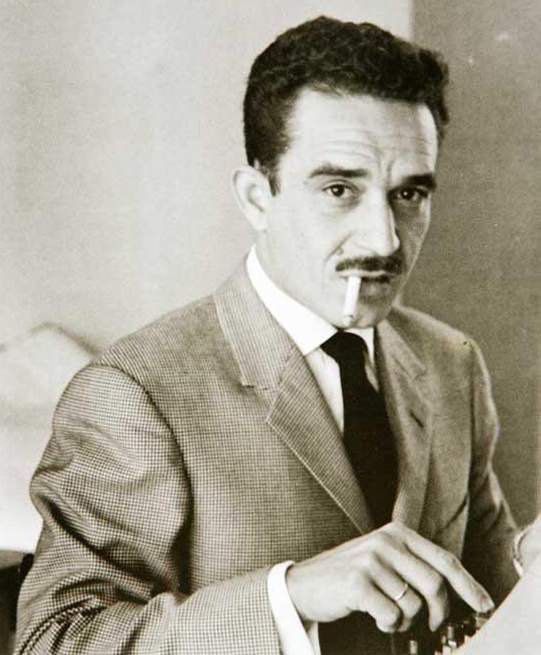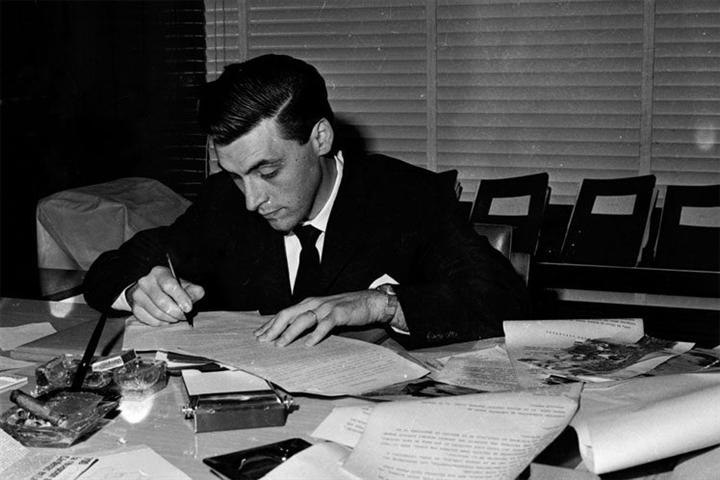By Gabriel Garcia Marquez
The first news broke in Prensa Latina’s main office, in Havana, where I worked in December 1960, and it was due to an almost implausible coincidence.

Jorge Ricardo Masetti, the general director, whose dominant obsession was to make Prensa Latina a better news agency than all the others, capitalist as well as communist, had set up a special teletype room, just to capture and then analyze the daily material of the press services of the whole world in an editorial board.
He spent several hours scrutinizing the long rolls of news that were constantly accumulating on his desk, evaluating the torrent of information repeated so many times due to so many conflicting criteria and interests in the offices of the different news agencies and, finally, comparing it with our own services.
One night, no one knew how, he came across a roll that was not news, but commercial traffic from Tropical Cable, a subsidiary of All American Cable in Guatemala.
Among the personal messages, there was one that was very long and dense, and written in an intricate code. Rodolfo Walsh, who in addition to being a very good journalist had published several excellent detective story books, insisted on deciphering that cable with the help of some cryptography manuals that he had bought in an old bookstore in Havana.
He got it after many sleepless nights, and what he found inside was not only exciting news, but a providential report to the revolutionary government.
The cable was addressed to Washington by a CIA official attached to the staff of the US Embassy in Guatemala, and was a detailed report on the preparations for an armed landing in Cuba with support from the US Government. It even revealed the place where the recruits were going to train: the Retalhuleu estate, an old coffee farm in northern Guatemala.
A MASTER IDEA
A man with Masetti’s temperament couldn’t sleep easy if he didn’t go beyond that accidental discovery. As a revolutionary and as a born journalist, he insisted on infiltrating a special envoy in the Retalhuleu estate.
During many clear nights, when we were meeting in his office, I had the impression that he was thinking of nothing else. Finally, and perhaps when he least expected it, he conceived the master idea. He suddenly conceived it, seeing Rodolfo Walsh, who was approaching through the narrow lobby of the offices with his little rigid gait and his short and quick steps.
He had clear, laughing eyes behind nearsighted lenses, with thick tortoiseshell frames, he was receding bald with floating pale locks, and his skin was tough and with old sun cracks, like the skin of a hunter at rest.
That night, as almost always in Havana, he was wearing very dark cloth pants and a white shirt, without a tie, with the sleeves rolled up to the elbows. Masetti asked me, “What does Rodolfo look like?” I didn’t have to think about the answer, because it was too obvious. “A Protestant pastor,” I replied.
Masetti radiantly replied, “Exactly, but a Protestant pastor who sells bibles in Guatemala.” He had finally reached the end of his intense lucubrations of the last few days. As a direct descendant from the Irish, Rodolfo Walsh was also a perfect bilingual. So Masetti’s plan had very little chance of failure.
It was about Rodolfo Walsh traveling the next day to Panama, and from there going to Nicaragua and Guatemala with a black dress and a turned-down white collar, preaching the disasters of the apocalypse that he knew by heart and selling bibles from door to door, until he found the exact location of the training ground.
If he managed to gain the confidence of a recruit, he could have written an outstanding report. The entire plan failed because Rodolfo Walsh was arrested in Panama due to an information error by the Panamanian Government. His identity was then so well established that he did not dare to insist on his bible salesman farce.
Masetti never became resigned to the idea that the Yankee news agencies had their own correspondents in Retalhuleu while Prensa Latina had to settle for continuing to decipher the secret cables.
Shortly before the landing, he and I were traveling to Lima from Mexico and had to make an unexpected stopover to change planes in Guatemala. In the suffocating and dirty airport of La Aurora, drinking ice cold beer under the rusty bladed fans of those times, tormented by the buzzing of flies and the effluvia of stale fried food from the kitchen, Masetti did not have a moment’s rest.
He was determined that we rent a car, escape from the airport and leave, without further ado, to write the big report on Retalhuleu. At the time, I already knew him well enough to know that he was a man of brilliant inspirations and bold impulses, but that, at the same time, he was very sensitive to reasonable criticism.
This time, as in some others, I managed to dissuade him. “OK, che,” he told me, convinced by force. “You already screwed me again with your common sense.” And then, breathing through the wound, he told me for the thousandth time, “You’re a quiet liberal.”
In any case, since the plane was late, I proposed a consolation adventure that he gladly accepted. We wrote a detailed four-handed story based on the many truths we knew from the encrypted messages, but making believe that it was information obtained by us on the ground after a clandestine trip around the country.
Masetti was laughing himself to death as he wrote, enriching reality with fantastic details that he was inventing in the heat of writing. An Indian soldier, barefoot and scrawny, but with a German helmet and a World War rifle, was nodding off by the mailbox, never taking his abysmal gaze from us.
Further on, in a little park with sad palm trees, there was a photographer with a box camera and black sleeve, the kind of man who took instant portraits with an idyllic landscape of lakes and swans in the background.
When we finished writing the story, we added a few personal diatribes that came from our souls, we signed our real names and our press titles, and then we had some testimonial photos taken, but not with the background of swans, but in front of the burning and unmistakable volcano that dominated the horizon at sunset.
A copy of that photo exists: Masetti’s widow has it in Havana. In the end we put the papers and the photo in an envelope addressed to General Miguel Ydigoras Fuentes, President of the Republic of Guatemala, and in a fraction of a second in which the soldier on duty let himself be overcome by drowsiness from his siesta, we took the letter to the mailbox.
Someone had said in public in those days that General Ydigoras Fuentes was a useless old man, and he had appeared on television dressed as an athlete at the age of 69, and had done somersaults on the bar and lifted weights, and even revealed some intimate feats of his manhood, to show his viewers that he was still a full military man.
In our letter, of course, there was no lack of special congratulations for his exquisite ridiculousness.
Masetti was beaming. I was less so, and less so, because the air was becoming saturated with a humid and icy vapor, and night clouds had begun to gather over the volcano. Then I wondered, frightened, what would become of us if an unexpected storm broke out and the flight were canceled until the next day, and General Ydigoras Fuentes received the letter with our portraits before we had left Guatemala.
Masetti was outraged by my devilish imagination. But two hours later, flying to Panama, and now safe from the risks of that puerile prank, he ended up admitting that we quiet liberals sometimes had a longer life, because we took into account even the least predictable phenomena of nature.
After 21 years [in 1981], the only thing that worries me about that unforgettable day is never having known if General Ydigoras Fuentes received our letter the next day, as we had anticipated during our metaphysical ecstasy.
jg/arb/ggm










